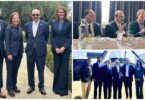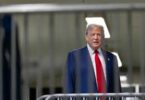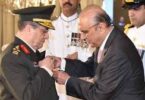U.N. sponsored talks between Libyan conflicting parties through Libyan Political Dialogue Forum (LPDF) came up with a formula to form a new interim government for Libya on Friday. The newly concluded agreement aimed at resolving a decade long chaos, division, and violence by holding national elections later this year. As per agreement, Mohammed Al-Menfi, a former diplomat from Benghazi, will head a three-members presidency council, while Abdul Hamid Dbeibeh, from the western city of Misrata, will head the government as Prime Minister. Libya has remained an epicenter of chaos after elimination of Muhammar Gaddafi’s government in result of military intervention by NATO in 2011. After a decade long civil war in the country, Libya has been split into two regions controlled by two opposing administrations backed by foreign powers in the west and east since 2014.
The two major armed groups got strong hold in certain areas, which led into division of the country into West and East Libya. The Government of National Accord (GNA) is recognized by the UN and backed by Turkey based in West Libya. Whereas, the Libyan National Army (LNA) led by Khalifa Haftar and backed by Egypt, UAE, Russian and France is based in East Libya. The magnitude of the problem can be easily accessed through the various surveys and statistics in this regard. According to a United Nations estimate the decade long conflict in Libya had caused about US $ 578 billion (£424bn) lost to the country so far. The US Acting Special Envoy to Libya has underscored that about 20,000 foreign troops from several countries or mercenaries are presently stationed in the country. The United Nations helped facilitate the talks between the warrying parties by representation of different segments of Society including political Parties, armed groups, Regional interests and social groups during the meetings held in Geneva to negotiate the political issues and composition of future government About 75 sessions of talks were held under UN patronage and succeeded in formation of a mutually agreed interim national government in Libya.
As a matter of fact, there had been non-democratic monarchs or military dictatorship in several Muslim countries of Africa or Middle East. These regimes had created a Political vacuum and lack of political sense in the public of those countries. Due to this political vacuum, when the monarch rule ended up, the chaos and anarchy spread everywhere, and the ill-organized political and armed groups emerged in the country. If there were any kind of political activity in those countries, the outcome may be a bit different. Beside it, the foreign intervention also distorted the situation and widen the differences among the internal political forces of the countries. The similar situation has been witnessed in Libya, Syria, and Iraq.
The newly formed executive authority will be comprised of all segment of society, geographical representation, youth participation and 30 per sent executive positions for women in the executive body. The unified executive authority will have to implement the ceasefire agreement, provide essential public services to the Libyan people, initiate a program for meaningful reconciliation, address critical national budget needs, and organize national elections, proposed to be held on December 24, 2021. Furthermore, the unified executive authority will work for establishment of the Presidential Council and complete implementation of ceasefire agreement of 23 October 2020, withdrawal of all foreign military troops and mercenaries from the Country.
There had been discussions among international experts and Scholars on UNO role and the jungle law in the contemporary world, where, the big powers and regional stakeholders encroached into the politically disturbed and fragile states on different pretext and proved to be an hurdle in restoration of stability and peace in the victim countries. Although, the United Nations worked to restore peace in the affected countries such as Iraq, Syria, Lebanon, and Libya but did not echoed against the countries involved in complicating the matters. The UNO must discourage this tendency by taking measures against the belligerent states. It must not allow any member state to act on UN behalf to fulfill its personal agenda.






